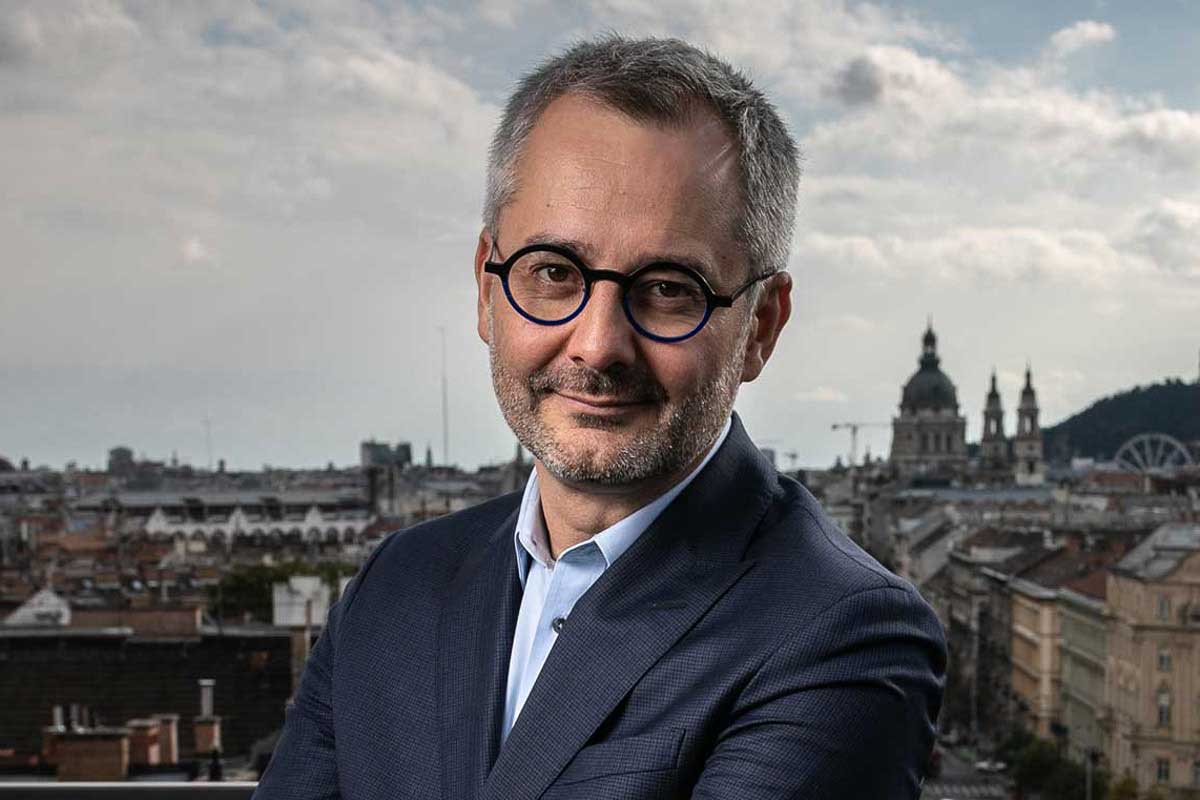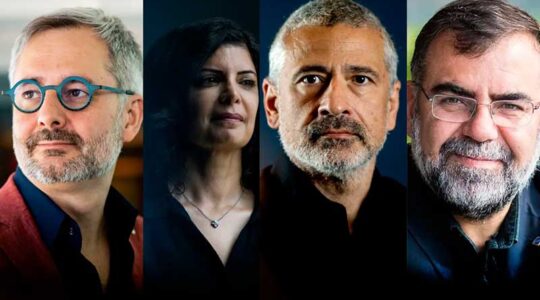Albert-László Barabási
Robert Gray Dodge Professor of Network Science, University Distinguished Professor, Jointly Appointed with College of Science

Research interests
- Network science
- Properties of sub-cellular networks in understanding human disease
- Control theory
Education
- PhD in Physics, Boston University
- MS in Theoretical Physics, Eötvös Loránd University — Hungary
- BS in Physics and Engineering, University of Bucharest — Romania
Biography
Albert-László Barabási is the Robert Gray Dodge Professor of Network Science and a Distinguished University Professor at Northeastern University, based in Boston. He directs the Center for Complex Network Research and holds appointments in the College of Science and the Khoury College of Computer Sciences. In 2024, he was elected to the National Academy of Sciences (NAS) for his work in network science.
Outside of Northeastern, Barabási holds appointments in the Department of Medicine at Harvard Medical School and Brigham and Women's Hospital in the Channing Division of Network Science. He is a member of the Center for Cancer Systems Biology at Dana-Farber Cancer Institute.
A Hungarian-born native of Transylvania, Romania, Barabási conducted the work that led to the discovery of scale-free networks in 1999. Following that, he proposed the Barabási-Albert model to explain their widespread emergence in natural, technological, and social systems, from the cellular telephone to online communities. Barabási has authored several books, including "Bursts: The Hidden Pattern Behind Everything We Do" (2010) and "Linked: The New Science of Networks" (2002); both are available in numerous languages. He also co-edited "The Structure and Dynamics of Networks" (2005).
Barabási is a Fellow of the American Physical Society and has received many awards for his work. In 2004, he was elected to the Hungarian Academy of Sciences. In 2005, he won the FEBS Anniversary Prize for Systems Biology. A year later, he won the 2006 John von Neumann Medal for outstanding achievements in computer science. He joined the Academia Europaea in 2007, and in 2008 he received the C&C Prize from the NEC C&C Foundation. In 2009, APS named him Outstanding Referee, and the US National Academies of Sciences awarded him the Cozzarelli Prize. In 2011, he was awarded the CRT Foundation's Lagrange Prize for contributions to complex systems and became an AAAS fellow in physics. In 2013, he became a Fellow of the Massachusetts Academy of Sciences, and in 2014, he won the Prima Primissima Award for his contributions to network science.
Barabási's lab focuses on network science and its applications, exploring fundamental questions in complex systems using tools from network science, control theory, and statistical physics. The lab comprises three key segments; research on network biology explores the properties of sub-cellular networks and their applications to human diseases, the lab network control aims to understand the controllability of complex systems, and the group on science of success explores the network and non-network characteristics that contribute to the success of nodes, webpages, and scientific collaboration networks.
Recent publications
-
Human-AI coevolution
Citation: Dino Pedreschi, Luca Pappalardo, Emanuele Ferragina, Ricardo Baeza-Yates, Albert-László Barabási, Frank Dignum, Virginia Dignum, Tina Eliassi-Rad, Fosca Giannotti, János Kertész, Alistair Knott, Yannis E. Ioannidis, Paul Lukowicz, Andrea Passarella, Alex 'Sandy' Pentland, John Shawe-Taylor, Alessandro Vespignani. (2025). Human-AI coevolution Artif. Intell., 339, 104244. https://doi.org/10.1016/j.artint.2024.104244 -
iGEM: a model system for team science and innovation
Citation: Marc Santolini, Leo Blondel, Megan J. Palmer, Robert N. Ward, Rathin Jeyaram, Kathryn R. Brink, Abhijeet Krishna, Albert-László Barabási. (2023). iGEM: a model system for team science and innovation CoRR, abs/2310.19858. https://doi.org/10.48550/arXiv.2310.19858 -
Hidden Citations Obscure True Impact in Science
Citation: Xiangyi Meng, Onur Varol, Albert-László Barabási. (2023). Hidden Citations Obscure True Impact in Science CoRR, abs/2310.16181. https://doi.org/10.48550/arXiv.2310.16181 -
Social AI and the Challenges of the Human-AI Ecosystem
Citation: Dino Pedreschi, Luca Pappalardo, Ricardo Baeza-Yates, Albert-László Barabási, Frank Dignum, Virginia Dignum, Tina Eliassi-Rad, Fosca Giannotti, János Kertész, Alistair Knott, Yannis E. Ioannidis, Paul Lukowicz, Andrea Passarella, Alex 'Sandy' Pentland, John Shawe-Taylor, Alessandro Vespignani. (2023). Social AI and the Challenges of the Human-AI Ecosystem CoRR, abs/2306.13723. https://doi.org/10.48550/arXiv.2306.13723 -
The Clinical Trials Puzzle: How Network Effects Limit Drug Discovery
Citation: Kishore Vasan, Deisy Morselli Gysi, Albert-László Barabási. (2023). The Clinical Trials Puzzle: How Network Effects Limit Drug Discovery CoRR, abs/2301.10709. https://doi.org/10.48550/arXiv.2301.10709 -
Mapping Philanthropic Support of Science
Citation: Louis M. Shekhtman, Alexander J. Gates, Albert-László Barabási. (2022). Mapping Philanthropic Support of Science CoRR, abs/2206.10661. https://doi.org/10.48550/arXiv.2206.10661 -
AI-Bind: Improving Binding Predictions for Novel Protein Targets and Ligands
Citation: Ayan Chatterjee, Omair Shafi Ahmed, Robin Walters, Zohair Shafi, Deisy Morselli Gysi, Rose Yu, Tina Eliassi-Rad, Albert-László Barabási, Giulia Menichetti. (2021). AI-Bind: Improving Binding Predictions for Novel Protein Targets and Ligands CoRR, abs/2112.13168. https://arxiv.org/abs/2112.13168 -
3D Topology Transformation with Generative Adversarial Networks
Citation: Luca Stornaiuolo, Nima Dehmamy, Albert-László Barabási, Mauro Martino. (2020). 3D Topology Transformation with Generative Adversarial Networks ICCC, 461-468. http://computationalcreativity.net/iccc20/papers/052-iccc20.pdf -
Give more data, awareness and control to individual citizens, and they will help COVID-19 containment
Citation: Mirco Nanni, Gennady L. Andrienko, Albert-László Barabási, Chiara Boldrini, Francesco Bonchi, Ciro Cattuto, Francesca Chiaromonte, Giovanni Comandé, Marco Conti, Mark Coté, Frank Dignum, Virginia Dignum, Josep Domingo-Ferrer, Paolo Ferragina, Fosca Giannotti, Riccardo Guidotti, Dirk Helbing, Kimmo Kaski, János Kertész, Sune Lehmann, Bruno Lepri, Paul Lukowicz, Stan Matwin, David Megías, Anna Monreale, Katharina Morik, Nuria Oliver, Andrea Passarella, Andrea Passerini, Dino Pedreschi, Alex Pentland, Fabio Pianesi, Francesca Pratesi, Salvatore Rinzivillo, Salvatore Ruggieri, Arno Siebes, Vicenç Torra, Roberto Trasarti, Jeroen van den Hoven, Alessandro Vespignani. (2020). Give more data, awareness and control to individual citizens, and they will help COVID-19 containment Trans. Data Priv., 13, 61-66. http://www.tdp.cat/issues16/tdp.a389a20.pdf -
Understanding the Representation Power of Graph Neural Networks in Learning Graph Topology
Citation: Nima Dehmamy, Albert-László Barabási, Rose Yu. (2019). Understanding the Representation Power of Graph Neural Networks in Learning Graph Topology NeurIPS, 15387-15397. https://proceedings.neurips.cc/paper/2019/hash/73bf6c41e241e28b89d0fb9e0c82f9ce-Abstract.html


